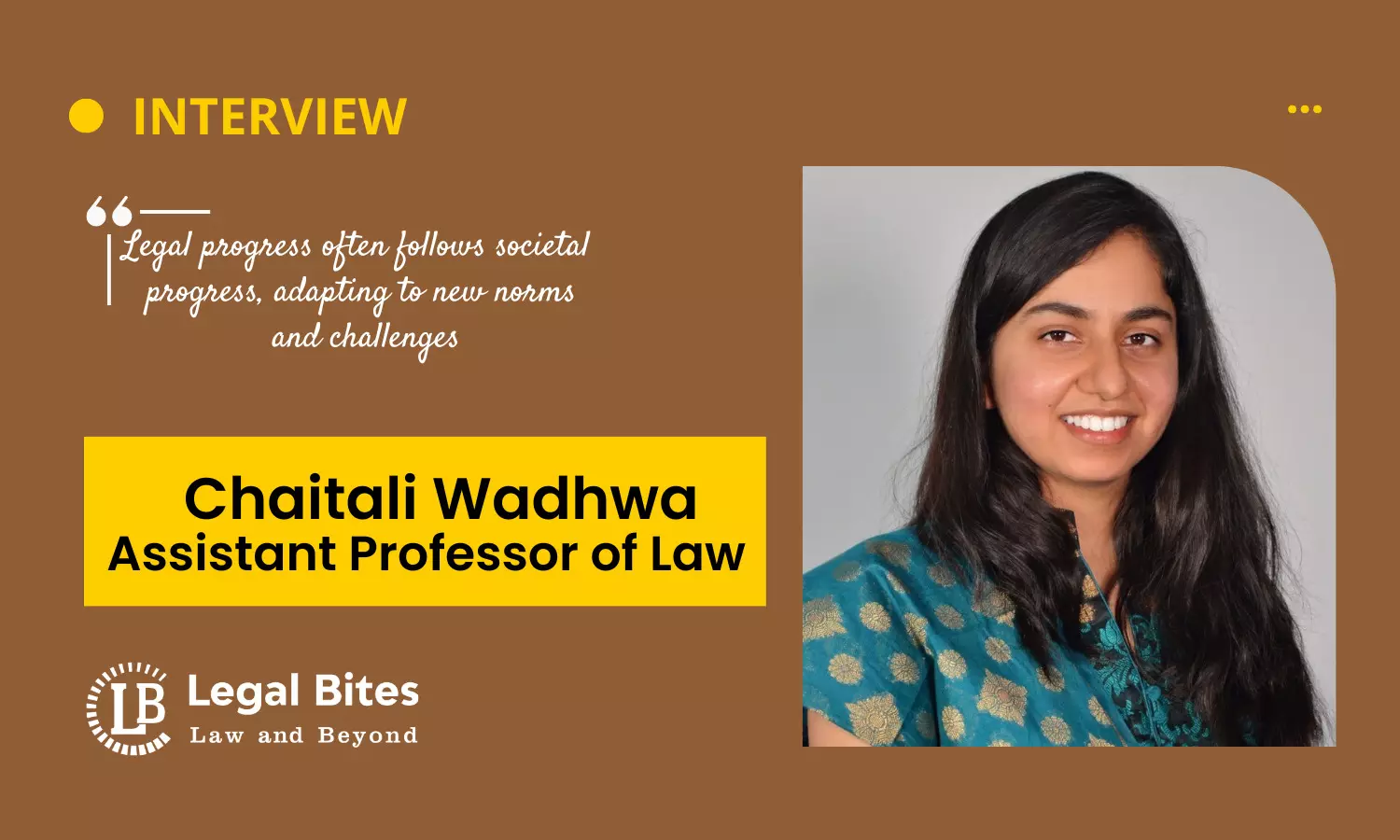Interview: Chaitali Wadhwa | Assistant Professor of Law | Manav Rachna University, Faridabad
We recently got a chance to interview Chaitali Wadhwa here’s the transcript of the Interview: Chaitali Wadhwa

Chaitali Wadhwa is an Assistant Professor at the School of Law, at Manav Rachna University. She earned her law degree from Amity Law School, GGSIP University, and completed her post-graduation at NLU Delhi with a dual specialization in Constitutional Law, Human Rights & Humanitarian Law. She is currently pursuing a PhD at Manav Rachna University in Gender and Law.
Having achieved notable success in national and international moot court competitions, she now serves as a judge in these events. Mrs. Wadhwa has contributed to 14 publications, including articles on topics such as "Fair and Equitable Treatment in Trade and Investment Laws" and "Maternity Discrimination in the Workplace," featured in the UGC Care Listed CPJ LAW JOURNAL (ISSN 0976-3652) among others.
Interview: Chaitali Wadhwa | Assistant Professor
In this interview with Legal Bites, Chaitali Wadhwa shares her experiences and insights, offering valuable guidance on key aspects of a legal career.
Legal Bites: What inspired you to seek a career in legal academia, especially in the fields of specialization in Constitutional law, Human Rights, and Humanitarian Law?
Chaitali Wadhwa: I’ve been passionate about gender justice and issues related to women’s rights since my Master’s Degree. My dual specialization in Constitutional Law, and Human Rights & Humanitarian Law fuelled that fire in me, pushing me to pursue a career that allows me to research these issues in more detail. Academia provides the opportunity to explore ongoing debates surrounding Gender and Law while simultaneously influencing the intellectual development of future generations. This platform to broaden young minds' thought processes and awareness is an immensely rewarding aspect of my chosen profession.
Legal Bites: How has your area of expertise in law changed or evolved in recent years?
Chaitali Wadhwa: Law is an evolving field. Through judicial decisions, amendments, and new legislation, there has been a shift towards the intersections of gender, caste, religion, and economic status, shaping legal strategies and policy reforms. Additionally, laws concerning transgender rights and evolving family structures have led to the re-examining of existing legal frameworks. Societal changes are driving these legal developments, making it a crucial time to be involved in shaping a more equitable future.
Legal Bites: Since every law student hopes to be an attorney or a judge, what made you consider becoming a professor?
Chaitali Wadhwa: The opportunity to delve into ongoing legal debates surrounding Gender and Law through in-depth research greatly excites me. Academia provides the perfect platform for this, allowing me to contribute to the evolving legal discourse on gender through research publications and workshops.
Additionally, I find it to be a great privilege to be in a position which has the potential to shape the minds of future generations. It’s motivating to ignite a passion for gender justice in young minds, broadening their understanding and critical thinking skills. I believe my strengths and aspirations lie in the profound impact I can make on the legal landscape through academic influence and inspiring the next wave of legal minds.
Legal Bites: How has your experience in moot court competitions been beneficial to your current career?
Chaitali Wadhwa: My extensive experience in moot court competitions since my first year of law school has equipped me well for judging competitions now.
Years of active participation, including national and international wins, gave me a strong understanding of students' challenges and pressures.
My passion for research honed through competitions allows me to assess the depth and quality of legal arguments presented. Taking judges' feedback seriously throughout my competitive career taught me the importance of clear evaluation. I can identify and apply established judging criteria to competitor performance.
Legal Bites: What are some of the most effective strategies students may use to prepare for moot court arguments that will help them in court?
Chaitali Wadhwa: Strategies for research –
- Prepare a timeline of events contained within the problem, and tabulate the documents that refer to each set of events.
- Begin research on the legal issues by reading broadly about the topics and issues mentioned in the moot problem.
- Confine research to arguments that are supported by statements of claim and defence.
Preparation for oral submissions -
- The mooter should support each argument made by three authorities (law, judgment, literature). These authorities may be found in the moot problem itself, or upon research by the participant.
- In the time available, the speaker is expected to cover all issues and arguments. To ensure efficiency, they should create a “roadmap”, highlighting the key points of the issues and laying a structure for how the arguments will proceed
- Mock sessions provide students with excellent opportunities to develop their oral arguments.
Legal Bites: You were recently a guest at Project Seekh for the discussion on Intersectionality in Gender & Law. Can you tell how intersectionality plays out in a real-world legal scenario?
Chaitali Wadhwa: India's diverse social fabric, with multiple intersecting identities based on caste, class, religion, and other factors, adds layers of complexity to the pursuit of gender-neutral laws.
Women from marginalized communities often face compounded forms of discrimination, making it challenging to address gender inequality in isolation. An intersectional approach that considers these overlapping identities and their unique challenges is crucial for ensuring that gender-neutral laws are inclusive and effective for all women, regardless of their social and economic backgrounds.
Legal Bites: According to you, How do implicit bias and stereotypes affect applying the law and access to justice for people of different genders?
Chaitali Wadhwa: Traditional gender roles and expectations often perpetuate gender-based discrimination and marginalization. For instance, the stigma associated with non-binary gender identities can lead to transgender individuals being ostracized by their families and communities. Biases and stereotypes can influence decisions about legal matters (child custody, plea bargaining, representation in harassment cases). They can influence how judges and lawyers interact with people of different genders. This can create a hostile environment and make it harder for them to feel heard and fairly represented.
Legal Bites: How do you stay updated with the latest developments in law to ensure you provide the best education to the students?
Chaitali Wadhwa: Regularly monitoring legal databases, scholarly journals, newspapers and legal publications, and legal websites/blogs to stay informed about recent legislative changes, landmark judgments, and emerging legal trends.
Legal Bites: In your opinion, how do online platforms such as Legal Bites assist young lawyers in staying updated on recent developments? Do you consider extensive online libraries such as Legal Bites a convenient resource for accessing information on a wide range of topics in one place?
Chaitali Wadhwa: Platforms such as Legal Bites provide concise summaries of new legislation, case law, and legal scholarship. They are readily available online, allowing law students and young lawyers to access updates anytime, anywhere.
These platforms provide clear explanations of complex legal issues and highlight key points in recent judgments or amendments, which can be particularly helpful for young lawyers who are still developing their legal knowledge.
Overall, online legal platforms like Legal Bites can be a valuable tool for young lawyers to stay informed, improve their legal knowledge, and connect with the legal community.

